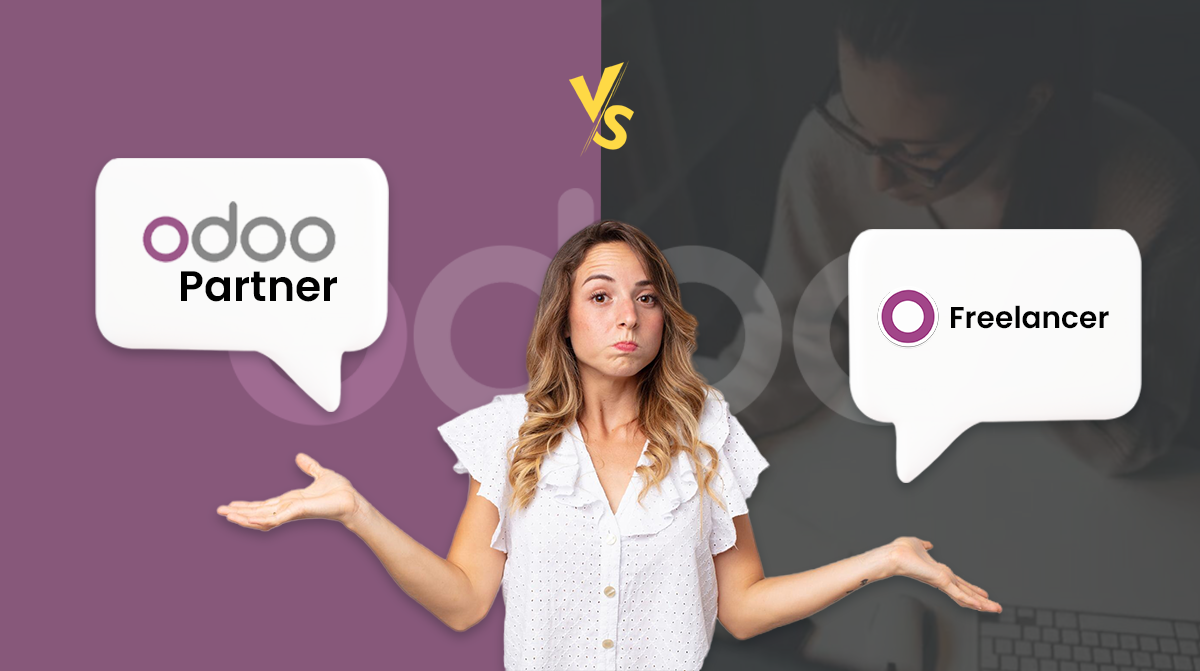This comparison of Odoo and ERPNext, two open-source ERP systems, aims to help businesses choose the right solution for streamlined operations and enhanced efficiency. The analysis covers their strengths and weaknesses, including comprehensive modules, scalability, and user-friendliness. The goal is to help businesses make an informed decision aligning with their specific needs and objectives, ultimately leading to the ideal ERP solution.
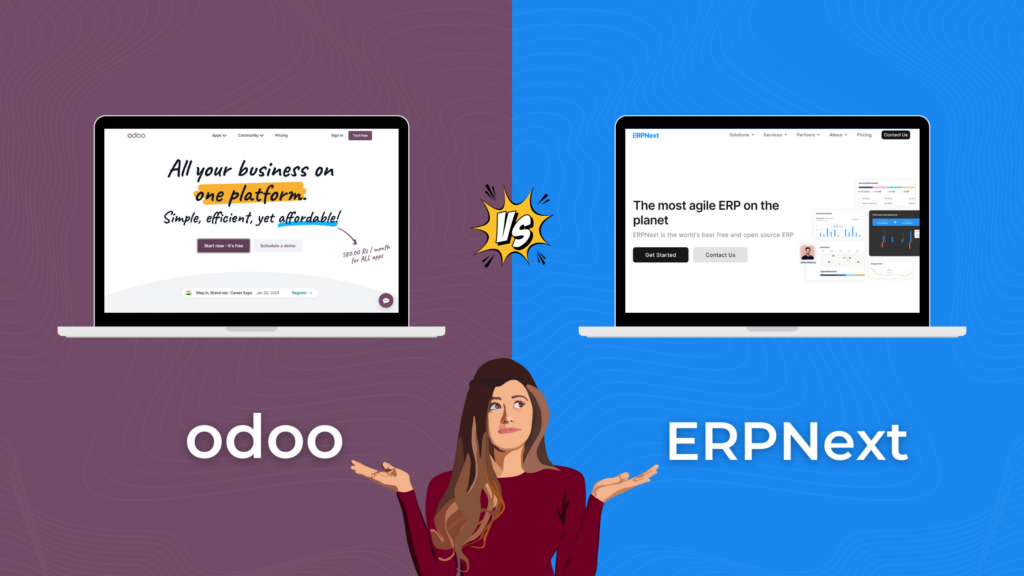
Odoo vs. ERPNext: An Overview
In the domain of ERP software, Odoo and ERPNext emerge as formidable contenders, with each presenting distinctive features. Undertaking an ERP software comparison reveals their robust capabilities and unique attributes.
Odoo: The All-In-One Software Solution
- Comprehensive Business Suite: Odoo facilitates an extensive array of applications, amalgamating CRM, accounting, inventory, and more within a unified platform. The ERP Systems Comparison showcases Odoo’s integration capabilities.
- User-Friendly Interface: Known for its intuitive design, Odoo provides a seamless user experience, catering to both technical and non-technical users.
- Extensive App Ecosystem: With a vast marketplace of customizable apps, Odoo allows businesses to tailor their ERP system to specific needs.
ERPNext: The Only Simplicity of Open Source
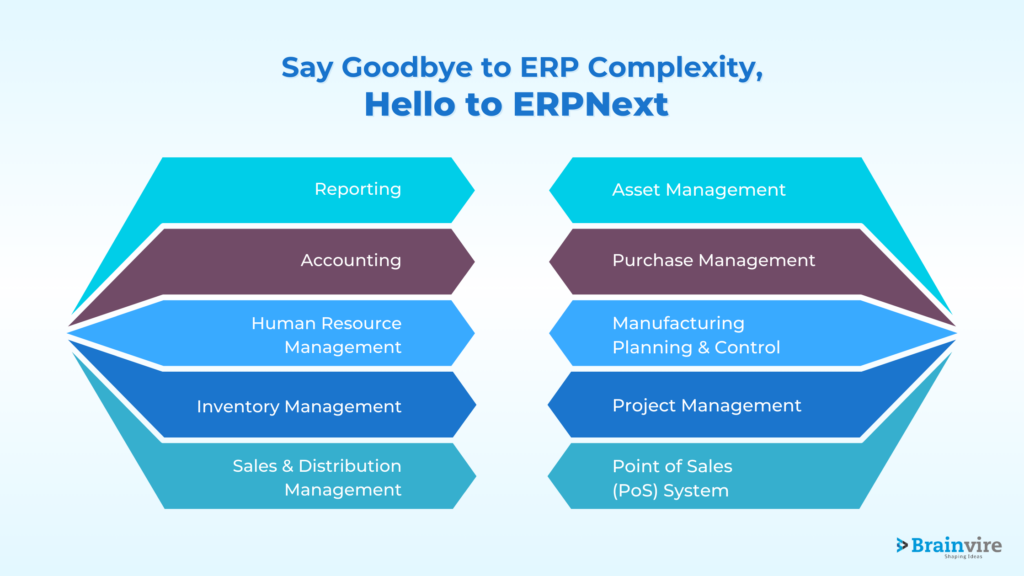
- Open Source Foundation: ERPNext, developed based on open-source principles, promotes transparency and flexibility in customization, making it an ideal choice for cloud ERP software comparison.
- Streamlined Approach: Emphasizing simplicity, ERPNext focuses on essential functions, making it an ideal choice for businesses seeking straightforward ERP solutions.
- Cost-Effective Cloud ERP: ERPNext’s cloud-based enterprise software capabilities provide cost-effective scalability, offering a competitive edge in the cloud ERP software arena.
Comparing Advantages: Odoo vs. ERPNext
Odoo and ERPNext have their own advantages when it comes to modernizing our business. Here are some of the advantages when compared to Erpnext Vs Odoo:
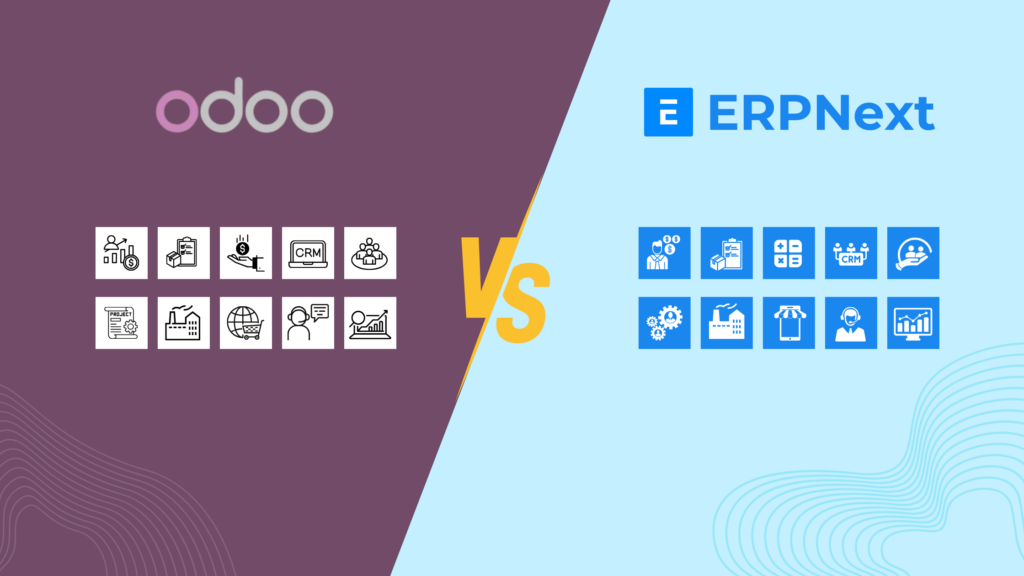
User-Friendly Interface
Odoo: Odoo’s user-friendly interface simplifies navigation and enhances user experience, allowing easy access to various modules without extensive training.
ERPNext: ERP software evaluation checklist includes ERPNext’s user-friendly interface and design, ensuring easy adoption and proficiency, thereby promoting a seamless workflow for users.
Modularity and Scalability
Odoo: Odoo’s modular structure allows businesses to customize and implement modules based on their specific needs, ensuring scalability and the ability to adapt to evolving ERP requirements.
ERPNext: ERPNext’s modular approach allows businesses to scale their ERP implementations organically, allowing them to adapt and grow without requiring a complete overhaul of their systems.
Open Source and Customization
Odoo: Odoo is an open-source ERP solution that allows users to customize and adapt the system to their unique business processes, fostering innovation and adaptation.
ERPNext: ERPNext, being open source, promotes customization and adaptability, allowing businesses to customize the source code to align with their workflows, ensuring a bespoke solution.

Community Support
Odoo: Odoo benefits from a vibrant and active community of users and developers. This community support fosters collaboration, knowledge sharing, and the development of additional features, enhancing the newly developed features of ERP systems.
ERPNext: ERPNext also thrives on community engagement, with users and developers actively contributing to forums and discussions. This collective effort creates a support network that aids in issue resolution and continuous improvement.
Integrated Applications
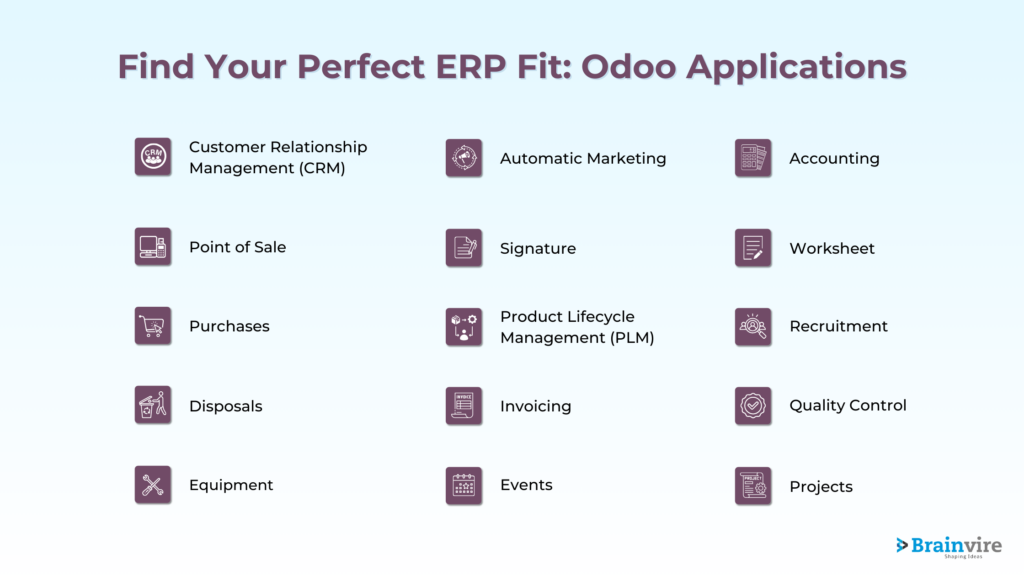
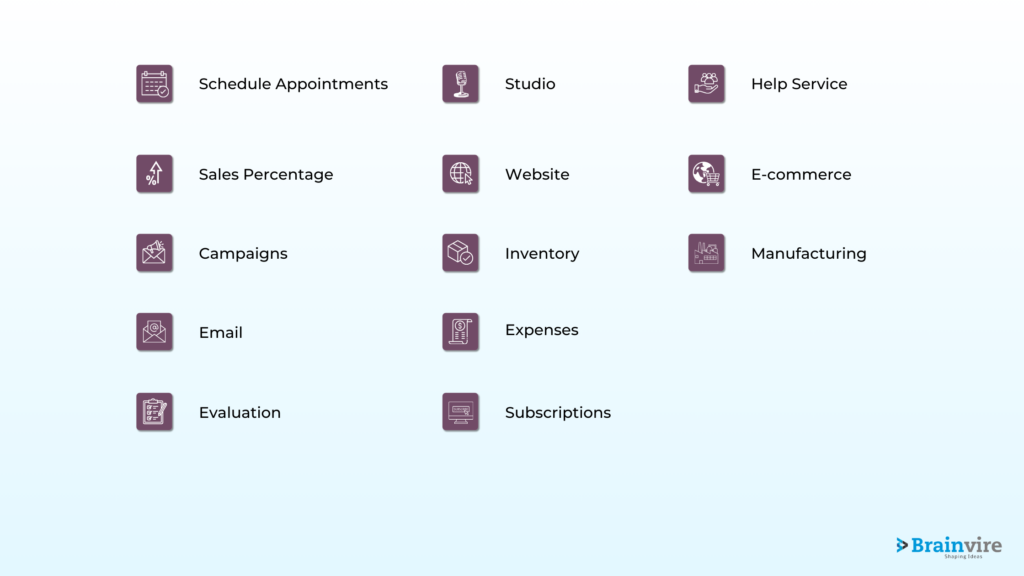
Odoo: Odoo’s strength lies in its seamless integration of various applications, enhancing efficiency by facilitating data flow across business functions and reducing silos.
ERPNext: ERPNext excels in integrating applications to create a unified ecosystem. The platform’s integrated approach ensures that data is interconnected, allowing for real-time information sharing and collaboration.
Mobile Accessibility
Odoo: Odoo prioritizes mobility by offering mobile accessibility, enabling users to access the ERP system from anywhere, enhancing flexibility and ensuring connectivity on the go.
ERPNext: ERPNext is designed for mobile accessibility, allowing users to access critical business information from their smartphones or tablets, ensuring key functionalities are not limited to desktop environments.
Workflow Automation
Odoo: Business continuity management software comparison highlights that automation is fundamental to Odoo’s functionality. Enterprises can automate repetitive tasks and streamline workflows, reducing manual effort and minimizing the risk of errors.
ERPNext: ERPNext focuses on workflow automation, enabling organizations to streamline processes, boost productivity, and maintain consistency in business operations.
Reporting and Analytics
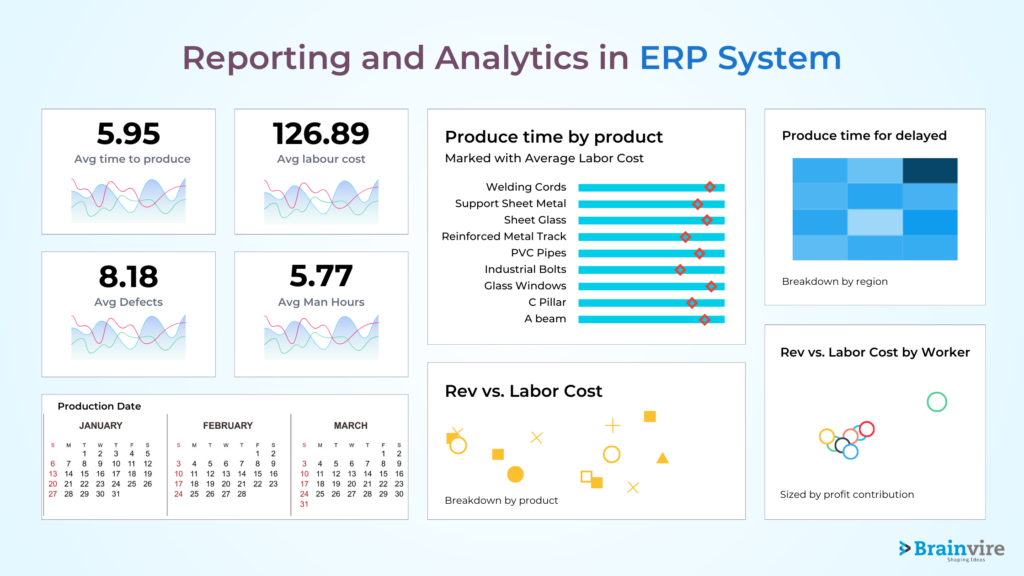
Odoo: Odoo offers comprehensive reporting and analytics tools, enabling businesses to gain valuable insights, make informed decisions, and customize reports and dashboards for better business performance.
ERPNext: ERPNext provides users with detailed reports and visualizations, enabling strategic decision-making through its comprehensive reporting and analytics features.
Cost-Effective Implementation
Odoo: Odoo is a cost-effective ERP solution that allows businesses to customize their modules and do ERP software price comparison while still providing a powerful system. 62% of SMEs surveyed identified cost savings as a notable advantage of utilizing Odoo.
ERPNext: ERPNext’s open-source model and modular design enable cost-effective implementation, allowing organizations to control expenses by selecting and implementing modules that align with their immediate requirements.
Regular Updates and Improvements
Odoo: Odoo consistently updates and improves its functionality, security, and user experience, ensuring businesses have access to the latest features and improvements.
ERPNext: ERPNext consistently updates its system to address bugs, introduce new features, and improve performance, demonstrating its commitment to providing a cutting-edge ERP solution.
Community App Store
Odoo: Odoo’s community app store offers community-developed modules and extensions for users to integrate and enhance their ERP system features and benefits.
ERPNext: ERPNext’s community-driven app store allows users to discover and integrate third-party apps, enabling businesses to customize their ERP solutions to meet their specific needs.
Multi-Currency and Multi-Language Support
Odoo: Odoo’s global orientation allows for the support of multiple currencies and languages, enabling businesses to operate in diverse regions and facilitate international expansion.
ERPNext: ERPNext enables businesses to operate in multiple currencies and languages, ensuring seamless global operations in a diverse and multi-lingual environment.
Scalable Cloud Infrastructure
Odoo: Odoo’s scalable cloud infrastructure provides businesses with flexibility to adapt to changing needs, ensuring growth without infrastructure limitations. For migrations, ERPNext manages 80% of the vanilla implementation.
ERPNext: ERPNext’s cloud infrastructure is designed for scalability, enabling businesses to expand operations without infrastructure constraints, ensuring the ERP system grows with the organization.
E-commerce Integration
Odoo: Odoo integrates with e-commerce platforms, streamlining processes from inventory management to order fulfillment, offering a comprehensive view of business operations.
ERPNext: ERPNext recognizes the importance of eCommerce integration and offers seamless connectivity with various e-commerce platforms. This integration ensures that businesses can manage both their ERP and e-commerce operations efficiently.
Read more: Exploring the Power-Packed Expected Features of Odoo 17 Enterprise Edition
Odoo vs. ERPNext: A Module-Based Comparative Analysis
Conducting a module-based comparative analysis of Odoo vs ERPNext reveals distinctions in scalability, customization, industry alignment, compliance, manufacturing, service orientation, integration, and research focus for optimal ERP selection.
| Module Features | Odoo | ERPNext |
|---|---|---|
| General | ||
| Multi-currency Support | Yes | Yes |
| Multi-language Support | Yes | Yes |
| Mobile Compatibility | Yes | Yes |
| Hosting | Yes | Yes |
| Version Upgrades | Yes | Yes |
| Electronic Data Interchange (EDI) | No | No |
| CRM | ||
| Lead Management | Yes | Yes |
| Leads Scoring | Yes | No |
| Sales Quotas | Yes | No |
| Email Integration | Yes | Yes |
| Email Templates | Yes | Yes |
| Website Call-To-Action | Yes | No |
| Bulk Data Import | Yes | Yes |
| Multi-sales Channel | Yes | Yes |
| In-Pipeline Management | Yes | Yes |
| Sales | ||
| Quotations | Yes | Yes |
| Pricelists | Yes | Yes |
| Quotation Templates | Yes | Yes |
| eSignature | Yes | Yes |
| Online Payments | Yes | No |
| Sales Orders | Yes | Yes |
| Invoicing | Yes | Yes |
| Marketing | ||
| Newsletters | Yes | Yes |
| Leads Tracking (Visited Pages) | Yes | No |
| Events | Yes | Yes |
| Surveys | Yes | Yes |
| Email Campaigns (Drip Emails) | No | Yes |
| Reporting | ||
| Sales Analysis | Yes | Yes |
| Pipeline Analysis | Yes | Yes |
| Sales Forecasts | Yes | No |
| Customizable Dashboards | Yes | Yes |
| Dynamic Reports | Yes | Yes |
| Dynamic Pivot Table | Yes | No |
| Inventory Module | ||
| Multi Warehouse | Yes | No |
| Storage Locations (Bins) | Yes | No |
| Stock Replenishment | Yes | Yes |
| Freight carrier integration | No | No |
| Stock Picking | No | No |
| Auto UOM Conversions | Yes | Yes |
| Up/Down Traceability | Yes | Yes |
| Batch Picking | No | Yes |
| Barcode Support | Yes | Yes |
| QR Code Support | Yes | No |
| Manufacturing Module | ||
| Multi-level BOM | Yes | Yes |
| Make-to-Order | Yes | Yes |
| Material Request Planning | Yes | Yes |
| Multiple Scheduling Plans | No | Yes |
| Work Order Merging/Splitting | No | Yes |
| Finite/Infinite Capacity Planning | Yes | Yes |
| Backward Scheduling | No | Yes |
| Job Tracking | ||
| Automated Time Tracking | Yes | No |
| Production Order Costing | Yes | Yes |
| Supply Chain | ||
| Supplier Management | Yes | Yes |
| Supplier Pricelist Management | Yes | Yes |
| Inward Quality Inspection | Yes | Yes |
| Purchase Orders | Yes | Yes |
| Contracts/Purchase Agreements | No | Yes |
| Drop-Shipping | Yes | Yes |
| Purchases Requests | Yes | Yes |
| Supplier Self-Service Portal | No | Yes |
Choosing Odoo vs ERPNext
Choosing the best ERP solution for small business is a critical decision. Among the myriad of options available, Odoo and ERPNext stand out as popular choices, each with their unique features and advantages.
Size and Complexity of Your Business
The ERP software evaluation is crucial, taking into account the size and complexity of your business. Odoo and ERPNext are tailored for different scales. Larger enterprises often prefer Odoo due to its scalability, whereas ERPNext is suitable for smaller businesses with straightforward needs.
Budget
Budget constraints are crucial in ERP software cost comparison. Odoo, an open-source solution, offers flexibility in module selection and cost-effectiveness initially. ERPNext, a subscription-based model, may have high upfront costs but offers regular updates and support.
Customization

Customization capabilities are critical for aligning the ERP system with specific business processes. Odoo shines in this aspect, allowing users to tailor modules extensively. ERPNext, while customizable, may require more technical expertise.
Industry and Specific Needs
Retail ERP Software Comparison is crucial as industry-specific requirements and compliance are of utmost importance. Odoo addresses a wider range of industries, whereas ERPNext is well-known for its adaptability to specific sectors, ensuring a tailored fit.
Service-Based Industries
Service-based industries benefit from Odoo’s project management and CRM modules, providing a holistic solution. ERPNext, with its service-oriented architecture, caters to this sector adeptly.
Manufacturing Capabilities
For businesses in manufacturing, ERP implementation tips for each platform’s capabilities are very important. Odoo offers comprehensive manufacturing features, including MRP and PLM, while ERPNext excels in production planning and shop floor management.
Integration with Third-Party Tools
Integration with third-party tools is best analysis feature for ERP system for a seamless workflow. Odoo boasts a vast marketplace for integrations, while ERPNext focuses on in-house compatibility, ensuring a cohesive ecosystem.
Regulatory Compliance
Features of ERP System encompass regulatory compliance as a non-negotiable aspect, providing tools for adherence on both platforms. The choice depends on the specific requirements of the industry and geographic location.
Research and Development Focus
ERP software evaluation checklist is crucial as the focus on research and development sets the trajectory for future enhancements. Odoo’s extensive community and continuous updates contribute to its innovation, while ERPNext’s emphasis on frugality may impact the pace of development.

Drawbacks in Odoo Compared to ERPNext: Practical Instances
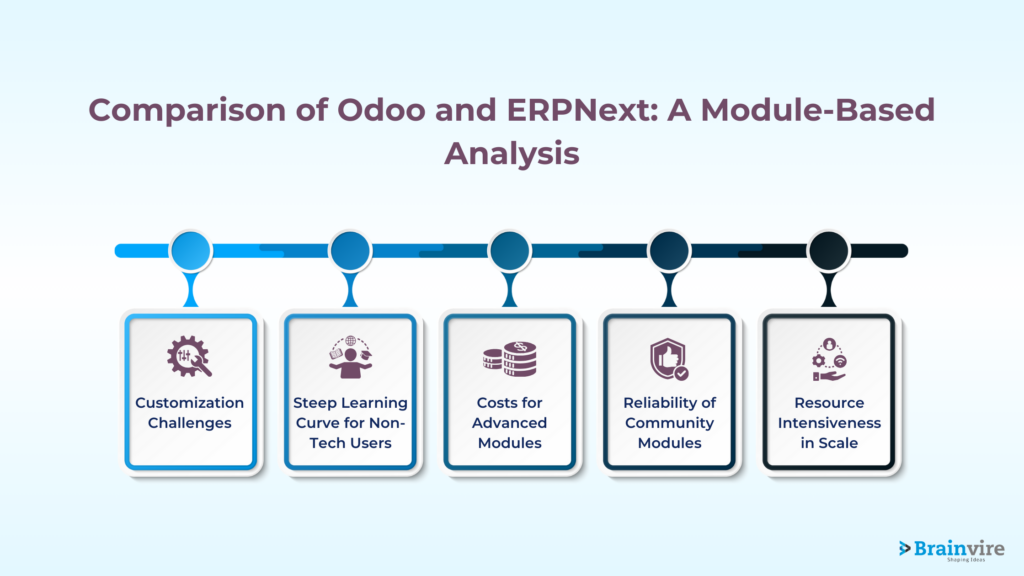
Odoo and ERPNext are both prominent open-source ERP (Enterprise Resource Planning) solutions, each with its strengths and drawbacks. Here are the drawbacks of Odoo compared to ERPNext, citing practical instances to illustrate these challenges:
Customization Challenges:
Odoo’s customization process is complex, especially for non-technical users, while ERPNext provides a more user-friendly experience, unlike Odoo’s intricate knowledge required for module modifications or creations.
- Example: manufacturing company needing to adapt Odoo to accommodate unique production processes, facing difficulties without proficient technical assistance.
Steep Learning Curve for Non-Tech Users:
Odoo’s extensive features and functionalities may be overwhelming for non-technical users, making it a more challenging learning curve compared to ERPNext.
- Example: Small business adopting Odoo for its ERP needs, where employees, accustomed to simpler systems, struggle to adapt, leading to reduced efficiency during the transition.
Costs for Advanced Modules:
While Odoo offers a wide range of modules, the costs associated with advanced modules can be prohibitive for certain businesses.
- Example: A retail company seeking to implement Odoo’s advanced inventory management module may find the licensing fees and additional costs burdensome, potentially making ERPNext a more cost-effective alternative.
Reliability of Community Modules:
In the context of open source ERP comparison, Odoo’s dependence on community-contributed modules introduces a potential reliability issue.
- Example: A service-oriented business implementing a critical feature using a community module may face challenges if the module lacks proper maintenance or compatibility with the latest Odoo updates.
Resource Intensiveness in Scale:
As businesses scale up, Odoo may demand substantial resources, both in terms of hardware and technical support.
- Example: A rapidly growing e-commerce enterprise may find that Odoo becomes resource-intensive, requiring constant optimization and dedicated technical support to maintain performance, compared to the more resource-efficient ERPNext.
Conclusion
Choosing between Odoo and ERPNext depends on a business’s needs and priorities. Odoo offers flexibility and scalability through its modular approach, while ERPNext focuses on simplicity and cost-effectiveness. How to evaluate ERP software involves understanding organizational requirements, budget constraints, and long-term objectives. Careful consideration of features, support, and community engagement is crucial for seamless integration, enabling businesses to thrive in the ever-evolving technological landscape.
Read more: How An Integrated ERP System Seamlessly Unifies Different Systems Within Your Business
Related Articles
-
How An Integrated ERP System Seamlessly Unifies Different Systems Within Your Business
A successful business decision relies on data collected from different aspects of business within the company and data obtained from customers, suppliers, and business partners externally. However, consolidating and managing
-
Odoo Partners Vs Odoo Freelancers – Right Choice for Odoo Implementation
Selection of a Right partner for Odoo implementation is crucial to successful project delivery. Comparatively, freelancers may seem more cost-effective, but an Odoo solution provider will give you better outcomes
-
Odoo vs. Microsoft Dynamics: More Advanced Functionality to Cater for All Your Business Needs
The right Enterprise Resource Planning (ERP) system is a crucial pipeline in companies’ attempts for growth, enhanced productivity, and automated processes in the hectic business environment. Odoo and Microsoft Dynamics


